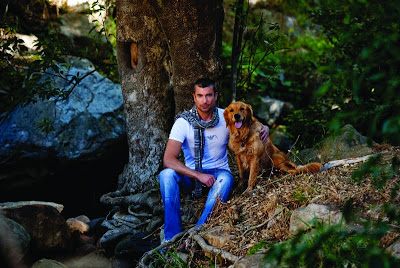 |
| David Sheldon |
Cape Town artist David Sheldon’s first solo exhibition, entitled The Gift: an expression of gratitude, is currently showing at the Avital Lang Artists Inc. Gallery in Mouille Point. David talks to the CJC about making it in the art world, how Judaism inspires him, and his perspective of living with HIV.
You exhibited your first collection of work at age 12. What inspired you at such a young age, and what
did your paintings focus on at the time?
I began creating from a very early age. I remember digging up raw clay in the veld behind our home as a child, making ashtrays and using my mom’s oven as a kiln. Everything inspired me to create. When I was 11, my entire diary of my visit to Israel with my parents was published in the school year book. My first exhibition at age 12 dealt with arachnophobia — one of my fears. The work was entitled “Spiders” and was done completely in pointillism. (Pointillism is a technique whereby the overall image is created by tiny dots).
What has been the inspiration for your art throughout your life?
I haven’t always been an artist. I began my art career about five years ago. Before that, I studied voice training and focused on the performing arts. I also dabbled in the food and clothing industries as well as being a regular featured columnist for iAfrica. My art today is mostly inspired by modernism, texture, décor, contemporary trends and fashion. I take what I feel at the time and try to express it on a canvas.
What are some of the themes that you have explored in your art?
I have dealt with numerous themes and none are particularly related. My earlier work dealt a lot with anger. Now my pieces have become more about the celebration of life and love.
Tell us about the different mediums you work in, and why you have chosen these various art forms?
I love working with as many mediums I can explore as possible. I’ve literally tried everything using lace, cement, cretestone, crushed glass, mirror, sand, wire, rust, acrylics, pastels, oils, resin, industrial varnishes and metallic leaf. I often use contrasting mediums that symbolise yin and yang; a juxtaposition of male and female.
Has Judaism inspired or influenced your work?
Everything inspires me. Studying the Kabbalah and mystical Judaism briefly certainly has had a major influence. One of my paintings, entitled “Conversations with G-d” is the only work that directly ties in with Judaism. The travertine mosaics symbolise the Wailing Wall in Jerusalem.
Who are your favourite artists, both internationally and in South Africa, and why?
My favourite artist of all time is Picasso. His work was original and revolutionary for his time. He also showed incredible versatility in his varied styles. I have many favourite local artists, but I particularly appreciate the work of Vanessa Berlein. She has mastered contemporary art and always re-invents her genre, making her work exciting and unpredictable.
What course of action would you recommend to young people who would like to make art into their career?
Believing in oneself and one’s talent is the basis of all success. There is no place for insecurity in the art world. If you don’t think your work is truly beautiful, no one else will either. Determination, passion, practice and originality are vital in becoming a recognised artist.
What are your thoughts on art in South Africa, and what challenges does it face?
Art in South Africa is of a very high standard. Other than Germany, South Africa is considered to be one of the best countries in the world to invest in art. Art generally stems from strife, pain, challenges and issues, and with its history of political conflict, South Africa certainly has had its fair share of turmoil. I would say the only challenge we face is the amount of artists there are in this country, where less than 10% of artists can actually live off their income.
You have lived with HIV for 20 years. What would you say to others who are living with HIV, and what is your perspective of living with the virus?
Many people living with the virus feel they have been punished for being gay or some other silly reason. Healing cannot occur if we assume the role of victim. Our biggest lesson here is to learn to love ourselves unconditionally. If we can accept responsibility in our lives, we step out of the victim role. Support is imperative and keeping it a secret will literally kill us. HIV is no longer a death sentence. Medication and treatment of HIV/Aids has proved to be a miracle and is saving lives every day. Find a purpose that is important and fulfilling to you. A sense of worth does wonders for the soul. Above all, remember that fear is a useless emotion. The only thing worth fearing is fear itself.











